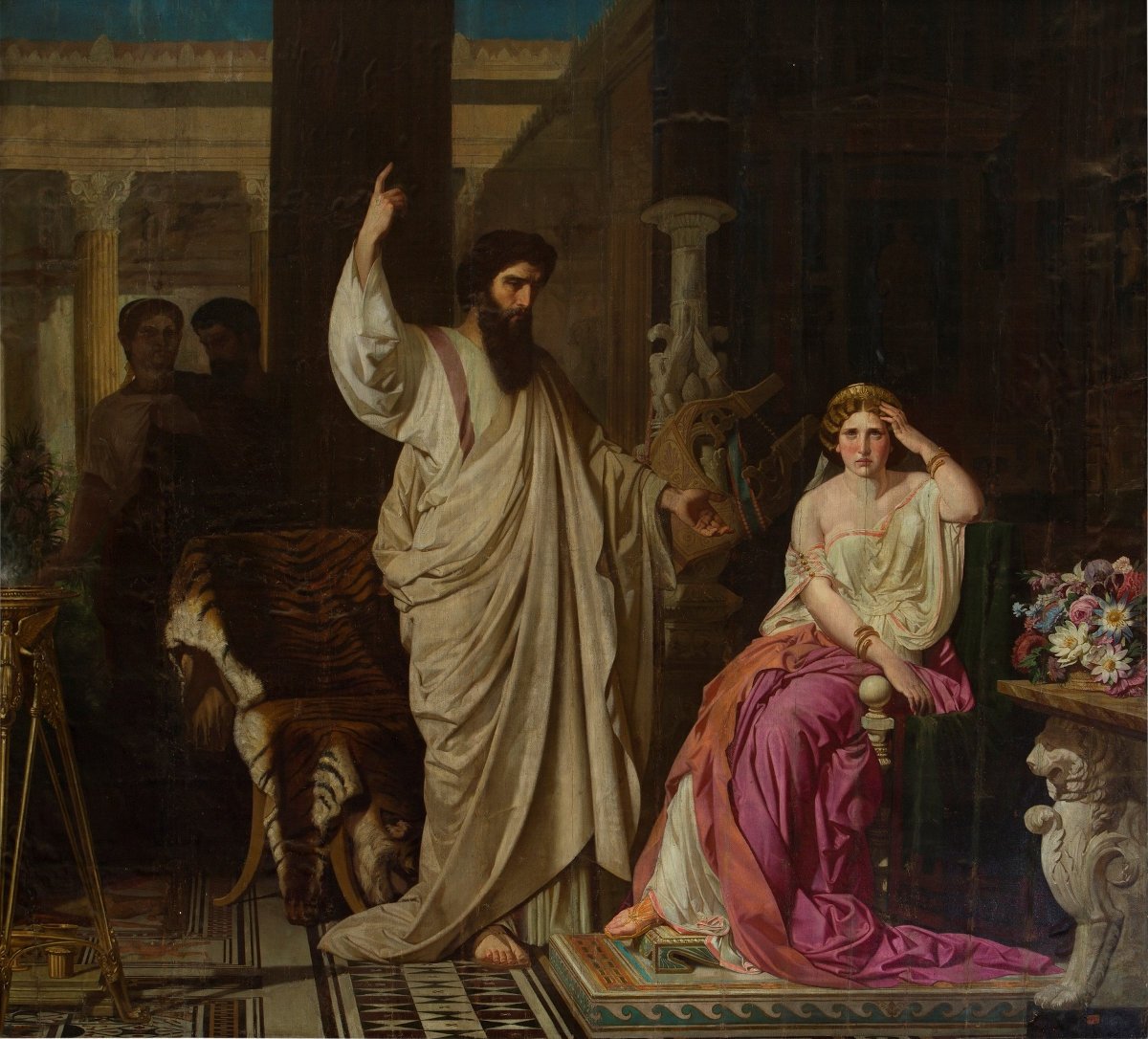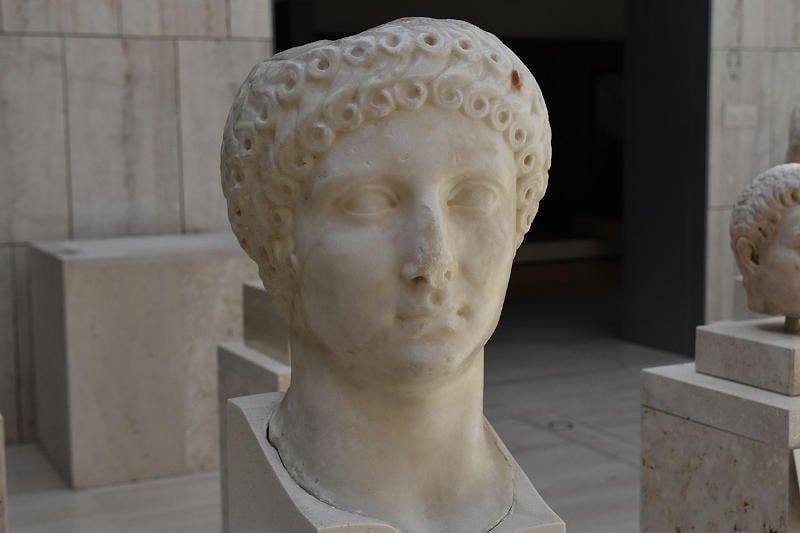
The Lady and the Emperor: The Dramatic Life and Death of Poppaea Sabina
Theatrics and excesses seem to run in the family of Nero, the emperor of Rome – that is, according to ancient authors such as Tacitus and Suetonius. Nero’s grandfather, Lucius Domitius Ahenobarbus, once staged a gladiatorial contest with such savagery that Emperor Augustus was forced to release an edict to restrain his excesses. Nero's father, Gnaeus Domitius Ahenobarbus, murdered a boy, deceived bankers, and was charged with treason and incest. Seemingly preparing the public for the next generation of the Ahenobarbus family, Nero’s father allegedly stated shortly after Nero's birth that any son born of Agrippina (Nero’s mother) and himself would be an abomination and a public nuisance.
- The Love Affair of the Roman Emperor Hadrian and the Handsome Antinous
- The Black Sheep of the Empire: Actors and Actresses in Ancient Rome
In his chronicle of the emperor's life, Suetonius portrays Nero as the consummate performer, playing roles both on and off stage until the Roman empire seemingly becomes a theatrical background and his principate a magnificent, yet tragic, opera. Not allowing status, gender, or species to stand in the way of a good role, Nero’s repertoire is impressively diverse. Not shy in staging and performing his own theatrical shows, the emperor plays heroes and heroines on stage, as well as gods and goddesses such as Niobe, Canace, Orestes, Oedipus, and Hercules. Off stage, Nero dressed himself in a cap or wig for nightly outings to beat or stab men on the streets after dark. He was also the groom in a marriage to the castrated boy Sporus, and the virginal bride to his freedman Doryphorus. Not surprisingly, Suetonius claims that Nero frequently confused role-playing and governance, going as far as to claim that, after the death of his wife Poppaea Sabina, he had Poppaea's son, his stepson Rufrius Crispinus, drowned by the boy’s own slaves because he enjoys role-playing as a general and an emperor. Apparently, Nero was frightened that the child's play-acting would become a reality.

A bust of Poppaea Sabina, wife of Nero. (Richard Mortel / CC BY-SA 2.0)
How to Marry the Emperor of Rome
In his Annals, Tacitus describes Poppaea Sabina as "a woman possessed of all advantages but a character." He elaborates by describing Poppaea Sabina as a beautiful woman from an affluent family. He also admits that Poppaea was a clever and entertaining conversationalist. However, Tacitus claims that “she paraded modesty and practised wantonness," describing Poppaea as an extremely materialistic and promiscuous woman enslaved by desire.
Poppaea's father, Titus Ollius, was implicated in Prefect Sejanus' failed conspiracy against Emperor Tiberius and committed suicide while Poppaea was only about one year old. Her mother, also known as Poppaea Sabina and recognised as the most beautiful woman of her day, fell victim to Empress Messalina's intrigues, who accused her of infidelity. She also committed suicide when her daughter was 17 years old.
By the time her mother died, the younger Poppea Sabina had already been married for three years. When she was 14, she was married to the affluent Rufrius Crispinus. Under the rule of Claudius, Rufrius Crispinus was the commander of the Praetorian Guard. Although this marriage produced a son, she soon divorced Crispinus and married Marcus Salvius Otho. Later, Otho himself would be an Emperor of Rome. But when he married Poppaea, he was merely one of Nero’s many wealthy and influential friends.
Tacitus accused Poppaea of simply marrying Otho to get closer to the emperor. Nero was already married to Octavia, daughter of his predecessor and adoptive father, Emperor Claudius. However, it was also possible that Nero, in love with Poppaea, encouraged his good friend Otho to marry her so that he could discreetly take her as a mistress without too much trouble. Nevertheless, Nero quickly disposed of Otho by assigning him a governorship of a distant province and annulling his marriage to Poppaea.
Nero's marriage to Poppaea Sabina was one part of a larger dramatic story of political intrigue and family discord which culminated into a legend. Poppaea, at least at the beginning, took on the role of the rather manipulative bride. Eager to marry Nero, she drew a wedge between Nero, his wife Octavia, and his mother Agrippina by frequently criticising his reliance on Agrippina. She also blamed Agrippina for the delay in her marriage to Nero. This tension leads to Agrippina highlighting her support for her more malleable daughter-in-law Octavia and holding on tightly to her power. This eventually led to Agrippina's assassination which Nero organised and carried out following his botched first effort to drown her at sea. Agrippina’s death paved the way for Nero to marry Poppaea.
After the death of Agrippina, Poppaea was left with only Octavia who stood in her way. As by now Poppaea was already pregnant by Nero, the young emperor needed to act quickly. Chaste, honourable and religious, Octavia was the epitome of Roman womanly virtues and was the opposite of Poppaea. By all accounts, Nero despised Octavia, and she reciprocated the sentiment. However, it was unfortunate for Nero that the Roman people adored Octavia and therefore abandoning her would have been a public relations disaster. Nonetheless, Nero rejected her. He then banished her to a faraway island and, after finding that this only served to boost her popularity even further, he had her assassinated. Although there are claims that Poppea demands that Octavia's severed head be sent to her, this is most likely a fable. In any case, Poppaea and Nero married soon after.




